The Americans with Disabilities Act, signed into law on July 26, 1990, has been a pivotal piece of legislation in the fight for equality and accessibility for individuals with disabilities. This landmark law has paved the way for significant advancements in the inclusion of people with disabilities in various aspects of American life, including employment, education, transportation, and public accommodations. The ADA has played a crucial role in breaking down barriers and challenging stereotypes, enabling people with disabilities to participate fully in their communities. Over the years, the ADA has undergone several amendments and updates to ensure that it remains relevant and effective in addressing the evolving needs of people with disabilities. One of the key provisions of the ADA is the requirement for public entities and private businesses to provide reasonable accommodations to individuals with disabilities, such as wheelchair ramps, Braille signage, and audio descriptions. The law also prohibits discrimination against people with disabilities in employment, housing, and other areas. The ADA has had a profound impact on the lives of millions of Americans with disabilities, enabling them to access education, employment, and healthcare opportunities that were previously inaccessible. The law has also spurred the development of accessible technologies, such as screen readers and closed captions, which have improved the overall quality of life for people with disabilities. Furthermore, the ADA has inspired similar disability rights laws and initiatives around the world, demonstrating the global significance of this legislation. Despite the progress made, there is still much work to be done to achieve full equality and accessibility for people with disabilities. Ongoing challenges include inadequate funding, lack of awareness, and persistent stigma surrounding disability. However, the ADA remains a powerful tool for promoting disability rights and empowering individuals with disabilities to reach their full potential. As the United States continues to celebrate the anniversary of the ADA, it is essential to recognize the law’s significance and recommit to the principles of equality, accessibility, and inclusion that it embodies. The ADA’s impact extends beyond the disability community, as it has also contributed to a broader cultural shift towards greater awareness and acceptance of diversity. The law has inspired a new generation of disability rights advocates and activists, who are working tirelessly to advance the cause of disability equality. In addition, the ADA has facilitated the development of innovative accessibility solutions, such as accessible pedestrian signals and audio announcements on public transportation. The law has also prompted the creation of disability-focused organizations and initiatives, which provide vital support and resources to people with disabilities. As the Americans with Disabilities Act continues to evolve and improve, it is clear that its legacy will endure for generations to come. The ADA’s emphasis on accessibility and inclusion has far-reaching implications for various sectors, including education, employment, healthcare, and transportation. By promoting equal access to opportunities and resources, the ADA has helped to create a more just and equitable society for all. In conclusion, the Americans with Disabilities Act is a groundbreaking law that has revolutionized the lives of people with disabilities in the United States and beyond. Its impact will continue to be felt for years to come, as it remains a powerful symbol of the struggle for disability rights and a testament to the power of advocacy and activism.
